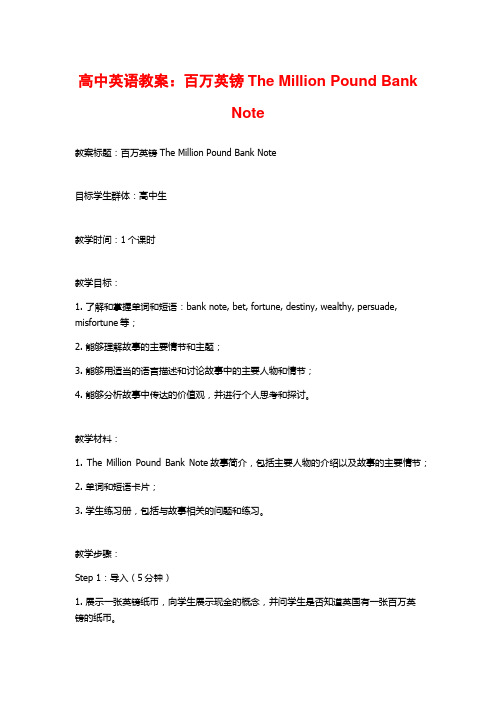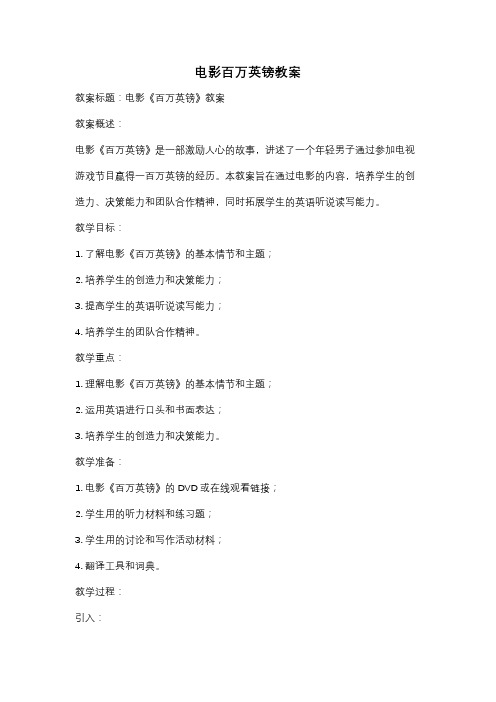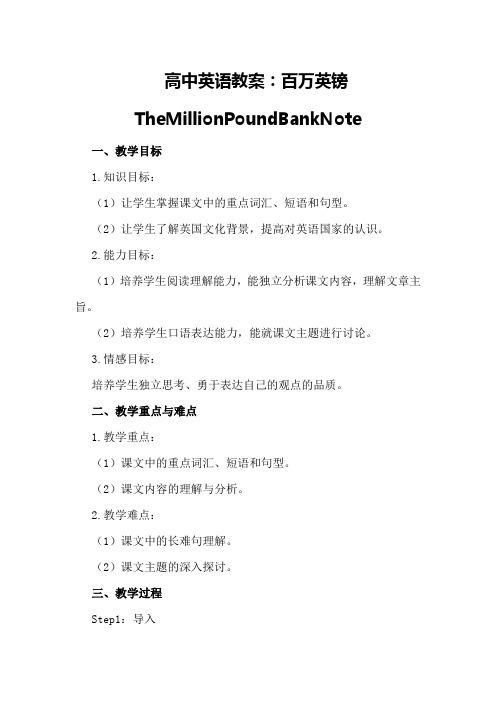百万英镑的语言和写作教学设计
英语教案百万英镑

Using Language部分中包括了听、读、写三个部分的内容,是本单元主要篇章的延伸。学生通过感受百万英镑给亨利带来什么样的待遇而进一步理解作者诙谐讽刺的写作风格。该部分比较连贯,提出的一些问题有利于培养学生独立思考的能力和文学素养。其中写作部分是训练学生选取和组织材料的能力,通过前面的学习,结合独立的思考,写出形象鲜明且语言流畅的戏剧。
用一般现在时态,台词中有很多的省略句等。
2. 教学难点
(1) 了解《百万英镑》及其作者马克?吐温的时代背景,提高学
生的文学修养和培养学生的跨文化意识;
(2) 学一个短剧和更难的比较长的戏剧。
III(教学计划
本单元建议分六课时:第一、二课时:Pre-reading, Reading & Comprehending第三课时:Using Language 第四课时:Learning about Language 第五、六课时:Workbook
? Mark Twain’s true name
二(Reading
1. Listen to the tape
2. Questions:
? How many characters are there in the play?? Who are they?
? What were they doing then?
Difficult points:
1.Enable students to learn use reading strategies as skimming and scanning.
2.Get students to act the play .
The_Million_Pound_Bank_Note教案

The_Million_Pound_Bank_Note教案第一章:课程简介1.1 课程目标了解并掌握《The Million Pound Bank Note》的故事情节和人物角色。
提高阅读理解能力,分析故事中的主题和象征意义。
培养批判性思维,讨论故事中的道德和伦理问题。
提高英语听说读写技能。
1.2 教学内容故事背景和作者简介故事情节概述人物角色介绍第二章:阅读理解2.1 目标理解故事的基本情节和事件。
分析人物的性格特点和动机。
识别故事中的主题和象征意义。
2.2 教学方法分组阅读和讨论故事的不同部分。
回答相关问题,加深对故事情节的理解。
分析人物行为和对话,了解其性格特点。
第三章:批判性思维3.1 目标培养批判性思维,分析和评估故事中的道德和伦理问题。
探讨故事中的社会和文化背景对人物决策的影响。
3.2 教学方法引导学生进行角色扮演,站在不同人物的立场思考问题。
组织小组讨论,分享对故事中道德问题的看法。
第四章:口头表达4.1 目标提高学生的口头表达能力,能够清晰地表达自己的观点。
培养学生的团队合作和交流能力。
4.2 教学方法分组讨论,让学生就故事中的问题进行讨论和表达自己的观点。
角色扮演活动,让学生模拟故事中的场景,锻炼口头表达能力。
第五章:总结与评价5.1 目标总结本节课的学习内容和成果。
评估学生的阅读理解、批判性思维和口头表达能力。
5.2 教学方法学生进行小组汇报,总结故事的主题和道德问题。
教师对学生的表现进行评价和反馈,提出改进建议。
第六章:文学分析6.1 目标分析小说中的象征元素和比喻。
探讨作者的写作风格和叙事技巧。
理解小说中的社会和文化批判。
6.2 教学方法引导学生识别小说中的象征元素和比喻。
分析作者的叙事视角和叙事结构。
讨论小说对当时社会现实的批判。
第七章:创意写作7.1 目标培养学生的创造性写作能力。
鼓励学生创作与小说主题相关的短故事或散文。
7.2 教学方法进行写作启发活动,如头脑风暴和情景设定。
高中英语教案:百万英镑The Million Pound Bank Note

高中英语教案:百万英镑The Million Pound BankNote教案标题:百万英镑The Million Pound Bank Note目标学生群体:高中生教学时间:1个课时教学目标:1. 了解和掌握单词和短语:bank note, bet, fortune, destiny, wealthy, persuade, misfortune等;2. 能够理解故事的主要情节和主题;3. 能够用适当的语言描述和讨论故事中的主要人物和情节;4. 能够分析故事中传达的价值观,并进行个人思考和探讨。
教学材料:1. The Million Pound Bank Note故事简介,包括主要人物的介绍以及故事的主要情节;2. 单词和短语卡片;3. 学生练习册,包括与故事相关的问题和练习。
教学步骤:Step 1:导入(5分钟)1. 展示一张英镑纸币,向学生展示现金的概念,并问学生是否知道英国有一张百万英镑的纸币。
2. 引入故事《The Million Pound Bank Note》,告诉学生故事的大致情节和主人公的遭遇。
Step 2:词汇学习(15分钟)1. 教师出示单词卡片,学生跟随朗读,并复习其意义,并用单词造句。
2. 教师展示短语卡片,学生跟随朗读,并复习其意义。
Step 3:故事理解(20分钟)1. 阅读故事简介,学生尽量理解故事的主要情节、人物和主题。
2. 学生阅读故事的部分段落,并回答相关问题。
Step 4:讨论与练习(15分钟)1. 学生分组讨论故事中的主要人物和情节,并用英语进行描述。
2. 学生根据故事回答一些问题,例如:1) What would you do if you were given a million pound bank note? 2) Do you think money can change people's lives? Why or why not?Step 5:反思总结(5分钟)1. 教师带领学生总结故事的主要情节和主题。
人教版英语百万英镑说课稿

人教版英语百万英镑说课稿教学目标1. 知识与技能:- 学生能够理解并掌握本课的核心词汇和句型。
- 学生能够听懂、会说、认读并正确拼写本课新单词。
- 学生能够理解并复述《百万英镑》故事的主要内容。
2. 过程与方法:- 通过小组合作学习,培养学生的合作意识和交流能力。
- 通过角色扮演活动,提高学生的口语表达能力和创造力。
3. 情感态度与价值观:- 学生能够体会到财富对人性的影响,引发对金钱观的思考。
- 培养学生的批判性思维能力,对待问题能有自己独立的见解。
教学重点与难点1. 教学重点:- 核心词汇和句型的掌握与运用。
- 故事情节的理解和复述。
2. 教学难点:- 对文章深层含义的理解与分析。
- 学生如何通过英语表达自己对故事的理解和感悟。
教学准备1. 教师准备:- 多媒体课件,包含故事插图、关键词汇和句型。
- 录音设备,用于播放故事录音和学生口语练习。
- 角色扮演活动所需的道具和服装。
2. 学生准备:- 提前预习课文,了解故事大意。
- 收集与主题相关的背景知识,如作者介绍、作品背景等。
教学过程一、导入新课- 通过提问引出话题,例如:“你们对金钱有什么看法?”“如果你们突然得到一大笔钱,你们会怎么做?”- 展示与金钱相关的图片或视频,激发学生的兴趣。
二、呈现新知- 利用课件展示故事《百万英镑》的插图,引导学生观察并描述图中内容。
- 教师领读课文,学生跟读,注意语音语调。
- 学生自主阅读课文,教师巡视指导,解答学生疑问。
三、操练与应用- 分组活动,每组选择一段故事进行角色扮演,其他小组成员给予评价。
- 教师提供关键句型,学生尝试用英语复述故事。
四、总结与拓展- 学生代表分享对故事的理解和感悟。
- 教师引导学生讨论金钱与幸福的关系,引导学生形成正确的价值观。
- 布置作业:写一篇关于“如果得到百万英镑”的英语短文。
五、课堂评价- 通过小组活动和角色扮演的表现评价学生的口语表达能力。
- 通过课堂提问和作业完成情况评价学生对课文的理解程度。
电影百万英镑教案

电影百万英镑教案教案标题:电影《百万英镑》教案教案概述:电影《百万英镑》是一部激励人心的故事,讲述了一个年轻男子通过参加电视游戏节目赢得一百万英镑的经历。
本教案旨在通过电影的内容,培养学生的创造力、决策能力和团队合作精神,同时拓展学生的英语听说读写能力。
教学目标:1. 了解电影《百万英镑》的基本情节和主题;2. 培养学生的创造力和决策能力;3. 提高学生的英语听说读写能力;4. 培养学生的团队合作精神。
教学重点:1. 理解电影《百万英镑》的基本情节和主题;2. 运用英语进行口头和书面表达;3. 培养学生的创造力和决策能力。
教学准备:1. 电影《百万英镑》的DVD或在线观看链接;2. 学生用的听力材料和练习题;3. 学生用的讨论和写作活动材料;4. 翻译工具和词典。
教学过程:引入:1. 向学生介绍电影《百万英镑》的基本情节,并引发学生对于赢得一百万英镑的讨论。
2. 学生观看电影《百万英镑》的预告片,激发学生的兴趣。
主体:1. 听力活动:a. 学生分组观看电影《百万英镑》的片段,并回答相关问题。
b. 学生听取电影中的对话或场景描述,完成相关练习题。
2. 口语活动:a. 学生分角色扮演电影中的人物,进行对话练习。
b. 学生就电影中的情节和主题展开小组讨论。
3. 阅读活动:a. 学生阅读电影《百万英镑》的剧本片段,并回答相关问题。
b. 学生撰写关于电影的读后感或评论。
4. 写作活动:a. 学生撰写一篇关于如何使用一百万英镑的短文。
b. 学生撰写一篇关于自己参加电视游戏节目的经历的短文。
总结:1. 学生分享他们的口头表达和书面作品。
2. 教师总结本节课的教学内容,强调学生在创造力、决策能力和团队合作方面的提高。
拓展活动:1. 邀请学生组织一场模拟电视游戏节目,让他们亲身体验电影中的情节和挑战。
2. 鼓励学生观看其他激励人心的电影,并就电影中的主题展开讨论和写作。
评估方式:1. 学生的口头表达和书面作品的评分;2. 学生对于电影《百万英镑》情节和主题的理解程度;3. 学生的团队合作表现。
百万英镑教学设计

百万英镑教学设计教学设计:百万英镑1.教学目标:-理解百万英镑的含义和价值;-讨论和分析如何实现百万英镑的方法;-培养财务规划和投资意识。
2.教学内容:a.引入(10分钟)-展示一张百万英镑的图片,引起学生的兴趣;-提问:“你们知道百万英镑代表什么吗?你们梦想过拥有百万英镑吗?”让学生思考并回答。
b.理解百万英镑(20分钟)-介绍百万英镑的含义和价值:百万英镑代表一百万英镑的财富,可以实现许多梦想和目标;-讨论百万英镑对个人和社会的意义:可以改善生活质量、提供良好的教育、帮助他人等;-引导学生思考:如何实现百万英镑?c.实现百万英镑的方法(30分钟)-分析赚钱的不同途径:工作收入、创业、投资等;-介绍财务规划的重要性:制定预算、管理开支、储蓄等;-探讨投资的风险和回报:股市、房地产、基金等;-提供实际案例和成功故事:如何通过聪明投资实现财富增长;-分组讨论:学生自由选择一种方法,讨论如何实现百万英镑。
d.财务规划与投资意识(30分钟)-介绍财务规划的基本步骤:设定目标、分析现状、制定计划、执行计划等;-引导学生制定个人财务目标;-讨论投资的重要性和风险:学生分享自己的投资经验或观点;-展示投资成功和失败的案例:让学生了解投资决策的重要性;-引导学生培养合理的投资意识,了解风险与回报的平衡。
3.教学方法:-启发式教学:通过提问和讨论引导学生思考;-小组讨论:让学生在小组中分享和讨论自己的观点和经验;-实际案例:通过实际案例展示投资的风险和回报;-角色扮演:让学生分组演绎财务规划和投资的情景。
4.教学资源:-展示百万英镑图片;-投资案例和成功故事的资料;-小组讨论的问题和任务。
5.教学评估:-小组讨论成果评估:评估学生对不同实现百万英镑方法的理解和分析能力;-财务规划目标设定:评估学生制定个人财务目标的能力;-投资意识评估:评估学生对投资风险和回报的理解和意识。
6.教学反思:-通过小组讨论激发学生的思考和参与;-利用实际案例和故事提高学生对投资的认识;-激发学生制定个人财务目标的意识;-充分利用互动和角色扮演等多种教学方法,提高学生的学习兴趣和参与度。
《百万英镑》教学设计范文

《百万英镑》教学设计范文《百万英镑》教学设计范文作为一位不辞辛劳的人民教师,往往需要进行教学设计编写工作,教学设计是实现教学目标的计划性和决策性活动。
教学设计要怎么写呢?下面是为大家整理的《百万英镑》教学设计范文,供大家参考借鉴,希望可以帮助到有需要的朋友。
学习目标1.熟读课文,了解故事发生的情境,能从内心批评和唾弃托德和老板在金钱面前的丑恶嘴脸。
2.通过对描写人物的语言的揣摩,把握托德和老板的特点,感受课文神态描写和语言描写的传神之处。
3.认识课文中的4个生字,积累有关语言。
课前准备课前介绍《百万英镑》的故事梗概。
课时安排1课时教学过程一、新课导入1.谈话:感受了中国文学作品中的一些人物形象,让我们再来看看外国作家笔下的人。
下面这篇课文选自美国著名作家马克土温写的短篇小说《百万英镑》。
2.了解故事梗概一个富豪之家的两兄弟,从银行中取出面额为一百万英镑的钞票,藉此验证这一百万的价值。
他们选择了身无分文的年轻人作为实验品。
于是一个流落伦敦街头的穷光蛋忽然之间得到了一张一百万英镑的钞票,他的生活由此发生了翻天覆地的改变,引起了他生活方式的突变……3.揭题:24*金钱的魔力二、自读课文,畅谈体会1.静心读文,想想可以用哪些词语概括老板和托德的特点,课文的哪些描写突出了这些特点。
2.交流阅读感受。
学生在四人学习小组交流,谈谈对两个人物的评价。
推选代表准备全班交流。
派代表分别在写有“老板”和“托德”的题板上写上概括性的词语。
例:老板:见钱眼开、金钱的奴隶……托德:以貌取人、刻薄、世故……3.各学习小组针对其中一个人物选取课文中一处最精彩的描写读一读,谈谈体会。
教师结合学生的交流,相机指导:关于“托德”:入木三分的语言描写:那个家伙摆出一副非常刻薄的嘴脸,说道:“啊,是吗?哼,当然我也料到了你没有带零钱。
我看像你这样的阔人是只会带大票子的。
”──他一听这些话,态度稍微改了一点儿,但是他仍旧有点儿摆着架子回答我:“我并没有恶意……恰恰相反,我们换得开!”──细致入微的神情刻画:他微笑着接了过去,那种笑容是遍布满脸的,……恰像你所看到的维苏威火山边上那些小块平地上凝固起来的波状的、満是蛆虫似的一片一片的熔岩一般。
高中英语教案:百万英镑The Million Pound Bank Note

高中英语教案:百万英镑TheMillionPoundBankNote一、教学目标1.知识目标:(1)让学生掌握课文中的重点词汇、短语和句型。
(2)让学生了解英国文化背景,提高对英语国家的认识。
2.能力目标:(1)培养学生阅读理解能力,能独立分析课文内容,理解文章主旨。
(2)培养学生口语表达能力,能就课文主题进行讨论。
3.情感目标:培养学生独立思考、勇于表达自己的观点的品质。
二、教学重点与难点1.教学重点:(1)课文中的重点词汇、短语和句型。
(2)课文内容的理解与分析。
2.教学难点:(1)课文中的长难句理解。
(2)课文主题的深入探讨。
三、教学过程Step1:导入1.利用图片或视频,介绍课文背景,引发学生对课文主题的兴趣。
2.邀请学生分享他们对“金钱”的看法。
Step2:课文阅读1.让学生快速阅读课文,了解文章大意。
2.教师带领学生分析课文结构,梳理文章脉络。
3.学生分角色朗读课文,注意语音、语调、停顿等。
Step3:重点词汇、短语和句型讲解1.教师选取课文中的重点词汇、短语和句型进行讲解。
2.学生跟读,模仿教师发音。
3.学生进行小组讨论,运用所学词汇、短语和句型进行练习。
Step4:课文内容分析1.教师提问,引导学生分析课文内容。
2.学生回答问题,分享自己的观点。
Step5:口语表达1.教师提出讨论话题,如:“金钱对人生的影响”。
2.学生分组讨论,准备论点。
3.各组代表发言,分享本组的讨论成果。
四、教学反思1.学生对课文内容的理解程度。
2.学生对重点词汇、短语和句型的掌握情况。
3.学生口语表达能力的提升。
4.教学过程中是否存在不足,如何改进。
五、教学延伸1.利用课后时间,让学生观看电影《百万英镑》,加深对课文的理解。
2.组织学生进行英语角活动,讨论金钱与人生的关系。
3.邀请家长参与课堂,分享他们对金钱教育的看法。
重难点补充:教学过程:Step2:课文阅读教师提问:“Whatdoyouthinkmighthappenifsomeonegaveyouamillion-poundba nknote?”学生回答后,教师引导:“Let'sseewhatactuallyhappensinthestoryreading'TheMillionPo undBankNote'.”教师让学生注意文章中对于人物动作、表情的描述,并提问:“Canyoufindanyexamplesofbodylanguageorexpressionsthatshowt hecharacters'emotions?”学生寻找并分享后,教师进一步引导:“Thesedetlscanhelpusunderstandthecharacters'feelingsandmot ivationsbetter.”Step3:重点词汇、短语和句型讲解教师选取“beggaringbelief”(难以置信)等表达,并提问:“Doesanyoneknowwhat'beggaringbelief'means?”学生尝试解释后,教师解释并给出例句:“Itmeanssomethingissosurprisingthatit'shardtobelieve.Forex ample,'Hisperformanceintheplaywassogood,itwasbeggaringbelie f!'”教师让学生练习使用该短语,并提问:“Canyoumakeasentenceusing'beggaringbelief'?”学生造句后,教师给予反馈:“Greatsentence!You'reusingthephrasecorrectly.”Step4:课文内容分析教师提问:“Whydoyouthinktheoldmangavetheyoungmanthemillion-poundbank note?”学生讨论并回答后,教师引导:“Itmightbebecausehewantedtoseeiftheyoungmanhadintegrityand wouldacthonorablywithsuchalargesumofmoney.”教师再提问:“Howdidtheyoungmanreacttothebanknote?”学生回答后,教师继续提问:“Doyouthinkhisreactionwasgenuineorwashejustacting?”学生讨论并分享观点。
- 1、下载文档前请自行甄别文档内容的完整性,平台不提供额外的编辑、内容补充、找答案等附加服务。
- 2、"仅部分预览"的文档,不可在线预览部分如存在完整性等问题,可反馈申请退款(可完整预览的文档不适用该条件!)。
- 3、如文档侵犯您的权益,请联系客服反馈,我们会尽快为您处理(人工客服工作时间:9:00-18:30)。
Module 3 Unit 3 The Million Pound Bank NoteKnowledge aims:Language points in the play:1) Words: permit, wander, penniless, spot, fault, unpaid, seek, patience2) Phrases: make a bet, go right ahead, by accident, stare at, account for, on the contrary3) Sentence patterns: Object and predictive clauses.Learning methodsListening, speaking, reading and writingStep1 Revision1. There are three main characters in the play. Who are they?They are Roderick, Oliver and Henry.2. What do you know about Roderick and Oliver?They are brothers, English, living in London, wealthy, making a bet on a penniless American. 3. And Henry?He is young, American businessman, is lost in London, penniless, is wandering outside the brothers’ house, is being given a million pound note.He used to be rich, had a boat, but when he was sailing out of the bay, he met a strong wind. And a ship spotted him on the sea and took him to England.Now he just want a job.Words flashback:wealthy make a bet penniless businessman wander spotThe group who can read the words get one point.The group who can read the words louder get two points.Purpose: This step will help the students to recall the topic and something about the context. Step2 Word studyI. Guess the meaning of each red words.1. At this moment, they see a penniless young man wander ing on the pavement outside theirhouse.Someone who is penniless has hardly any money at all. (poor, a young man without any money)If you wander in a place, you walk around there in a casual way, often without intending to go in any particular direction.A pavement is a path with a hard surface, usually by the side of a road2. Would you please come in? Permit me to lead the way, sir.Your teacher, Miss Wang, permitted me to have a class here.Our school doesn’t ______ students to smoke. (allow, permit)3. It was all my fault.A fault is a mistake. If you caused sth bad happened, you would have to be responsible for it.4. The next morning I’d just about given myself up for lost when I was spot ted by a ship.(found)5. I earned my passage by working as an unpaid hand, which accounts for my appearance.6. Roderick asked Henry to have patience.Purposes: Let the students find the formation and usage of the new words in the play through the teacher’s explanation.II. Word formationpenny penniless pavement movementpermit (allow) permitted permitted spot spotted spottedunpaid paid appearance appear patience patientPurposes: Let the students remember the formation of the word again.III. Word check (Can you fill in the blanks according to your memory?) (one word one mark) penny ---________ (身无分文的)permit _______(过去式) _________(过去分词)spot _______(过去式) _________(过去分词)paid _______(反义词)appear __________(名词形式)patient ________(名词形式)Purposes: To check whether they have mastered the formation of the word.IV. CompetitionFill in the blanks, using the proper form of the word in the bracket.(one word two marks)1. His anger showed that he was _________ (satisfied) with our answer.2. Though he is ten years old, he is still ______ (able) to talk to us.3. We were amused at his funny ________ (move) in doing morning exercises.4. The sudden ________ (appear) of a policeman caused the thief to run away.5. He was disappointed so often that he became ________ (hope).(uncountable, unsatisfied, unimportant, unusual, unable)(movement, pavement, achievement)(careless, useless)(performance, disappearance, appearance, importance)Purposes: This part is used to extend their knowledge of word formation.Step3 Phrase studyI. The original sentences from the play’d mind us asking a few questions.# --- May I use your dictionary? ---Go ahead.# He made this mistake by accident, not on purpose.My finger got hurt by accident by a piece of paper. (3. I earned my passage by working as an unpaid my appearance.# His illness accounts for his absence. ()# You think you are clever; on the contrary, I think that you are very foolish.你自以为很聪明, 相反地, 我确信你很傻。
5. His eyes stare at what is left of the brother’s dinner on table.# stare at: look at sb./sth. with the eyes wide open瞪着眼睛凝视It’s rude to stare at others. 盯着人看是没有礼貌的。
II. Phrase memory (one mark for each word)go ______ _______ accident _______ a matter of factaccount ______ ________ the contrary stare __________________III. Relaxation timeLast week I went to a shop in the cultural market. I was walking into the shop when a young lady stepped on my feet by accident. She didn’t say sorry to me, on the contrary, she left the shop angrily. At the moment I spotted a lady’s wallet on the counter, I realized the wallet belonged to the lady who just left the shop. Maybe she would be back to look for it, so I gave the wallet to the owner of the shop. Just then she came back, her tears could account for why she rushed back. Without saying anything, she stared at me.Tasks:1. Read the story on the screen and fill in the blanks. (one phrase one mark)2. Group discussion:①Guess what happened to me next? (one proper ending five marks)②Use three or four of the phrases to make a meaningful story, and the leader of yourgroup will show it.Purposes: This part is used to practice listening and motivate students’ interest of learning.Step4 Sentence structure explorationI. Emphatic sentences: It is/was…….that…..1. Original sentences in the play:1) It is Henry Adams, an American businessman, who/that is lost in London and does not know what he should do.Henry Adams, an American businessman, is lost in London and does not know what he should do.2) It was the ship that brought you to England.The ship brought you to England.2. Time for imitation:Use a sentence to describe the picture.The old man is making tea happily at home.It is the old man that is making tea happily at home.It is tea that the old man is making happily at home.It is at home that the old man is making tea happily.Purposes: This part is used to let the students find the structure of emphatic sentences and practice using the sentence structure.II. Object clauses2. Time for reading and findingPlease find the verb and object clause in each sentence. (one sentence one mark)6) I didn’t know whether I could survive until morning.7) May I ask how much money you have?8) I don’t think it’s funny.9) I think I will be on my way.10) You mustn’t think we don’t care about you.11) We know you are hard-working.12) Why don’t you explain what this is all about?IV. Imitation time: (根据图画,说出带有宾语从句的句子)I know that _________ ( he/ fly a kite).I know that __________(it/ sunny) today.I wonder ________ (who/come/with him)I wonder _______(where/he/ live).Do you have any other idea to describe the picture?Purposes: Students of different levels all have a chance to use English creatively and practically.Step5 Quiz time1. It was in New Zealand ______ Jenny first met Mr. Smith.A. thatB. howC. whichD. when2. You can only be sure of _____ you have at present;you cannot be sure of something _____ you might get in the future.A.that; what B.what; / C.which;that D./;that3. Having checked the doors were closed, and _____ all the lights were off, the boy opened the door to his bedroom.A. whyB. thatC. whenD. where4. The traditional view is __ we sleep because our brain is “programmed” to make us do so.A. whenB. whyC. whetherD. thatStep6 Homework1. Recognize predictive clause:The fact is that I earned my passage by working as an unpaid hand.That is why we’ve given you the letter.2. Make at least five sentences with predictive clauses to describe spring.3. 用括号中所给词或短语的适当形式完成下列句子。
